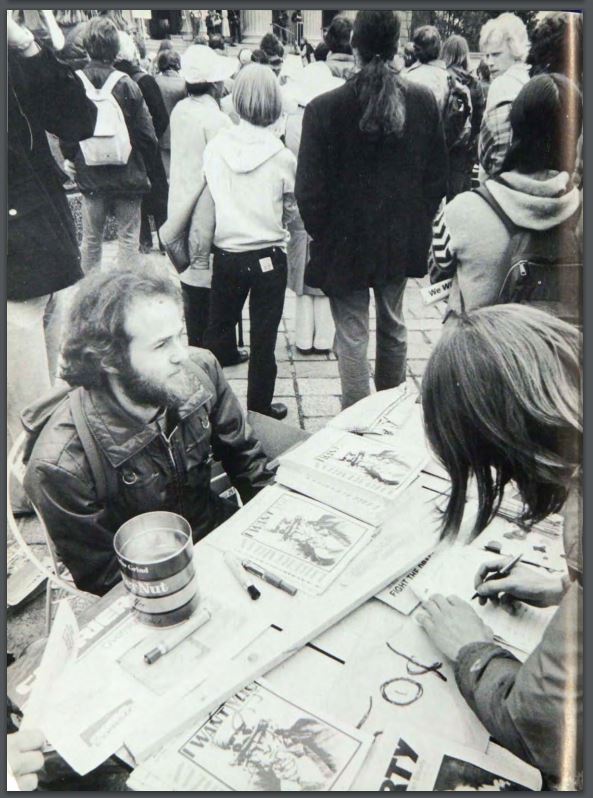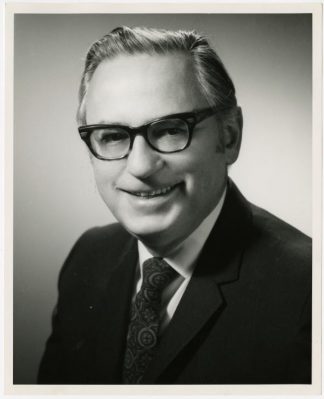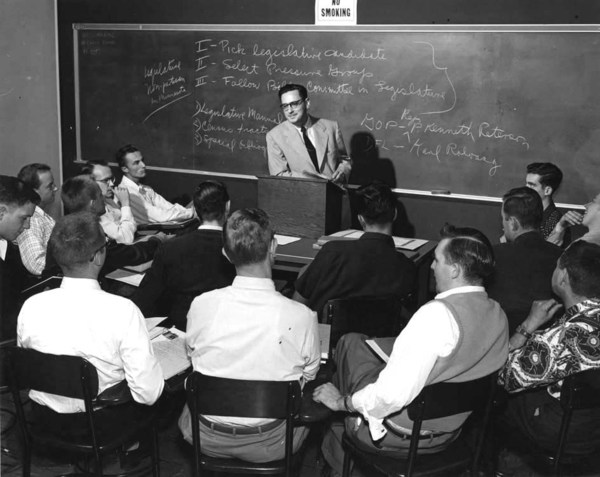Our episode today will be the last for 2016, and the podcast will return mid-January. Thank you for tuning in every other week for our attempt to bring you this sampling of the variety of history and programming produced by the campus radio stations for the U and the greater Minnesota area.
When selecting digitized audio from the myriad of topics and programs in the collections here at University Archives, it can be a struggle (although, a delightful one) to choose one episode over another. Today we are featuring an episode from 1979 of the discussion program, Minnesota Issues. The host for the show, Arthur Naftalin, introduces the pessimistic atmosphere of the country but finds that the younger generation still has hope looking ahead to the 1980s.
Hear how his guests, Humphrey School graduate students, remain cautiously optimistic and strong willed in fighting for a difference despite the turmoils of the 1960s and 70s and the lack of leadership they see in the upcoming election. This episode was chosen as a message of hope to end this year and bring in the new with sincere wishes that, as stated by one of the program’s guests, “the enthusiasm and the energy of the human spirit can break through.”
You can listen to the episode here in the browser and read the script below.
Podcast (umnradio): Play in new window | Download
Episode 5: Looking ahead to the 1980s
You are listening to U of M Radio on Your Historic Dial podcast and this is episode 5: Looking ahead to the 1980s
Hello! Karen here, project archivist at the University of Minnesota Archives, today we are tuning into the program Minnesota Issues with an episode that aired December of 1979.
The program was hosted by Arthur Naftalin on the University Television Hour and rebroadcast over KUOM from 1976 through 1988. At the time, Naftalin was a Professor of Public Affairs at the University of Minnesota, but he had held other instructional and staff positions before at the University, including editor of the Minnesota Daily. He also worked closely with Hubert H. Humphrey on merging the democratic and farmer-labor parties in the 1940s and had various political positions in the 1950s and 1960s, including being the Mayor of Minneapolis from 1961 through 1969, before returning to the University of Minnesota.
On this episode he has invited graduate students from the Humphrey Institute of Public Affairs, now the Humphrey School of Public Affairs, to discuss the future as they see it entering the new decade. I think you’ll find some of their statements and feelings of hesitation and hope can still ring true more than 30 years later. Naftalin, or Art, as he is often referred to on the show, introduces a pessimism and atmosphere of despair in the country, yet his students surprisingly remain fairly optimistic. In the next clips Elizabeth describes how important optimism is and fellow student, Tom, adds that although optimistic he is cautious and explains how given the events of the turbulent past decade it has shaped a different way of thinking for his generation.

Inside cover of “Minnesota: the Magazine of the University of Minnesota Alumni Association,” June 1979. University Archives. 600 protesters rally against the “new draft,” the proposed registration for the Selective Service System.
Moving on to more specifically looking at life in Minnesota, Naftalin and the students discuss why they hope to stay and work locally and discuss the openness or perceived openness of the state in the 1970s. One can always hope that Minnesota continues to be this place they describe “to fight it out and make a difference.”
The episode wraps up here with a question of political leadership for the upcoming elections and how the students would like this leadership described and whether or not it is currently present. I find the overall consensus is that it is not present in 1979, which given the events mentioned by Tom in the beginning, it is not surprising to find caution and frustration.
In looking ahead to the 1980s with Naftalin and his students, I think we can still see a lot of our present day society. Having these conversations in the United States, at the least, every four years it is easy to draw parallels to these hopes and frustrations from decade to decade when we ask what does a leader look like to each of us. I wanted to end today’s episode on Nancy’s reason for hope and optimism in a well-expressed answer to Naftalin’s first question about the students’ views of the future.
“I think as long as people continue to ask questions and continue to struggle and continue to be willing to get up in morning, if you will, that there is hope. If the enthusiasm and the energy of the human spirit can break through in even just a few cases and there are many around.[…] Given that there are those people around us every day that there is real reason to be optimistic about the possibilities of the future.”
Thanks for tuning in!
The U of M Radio on Your Historic Dial Podcast is produced every other week for your enjoyment. Subscribe or download on iTunes or GooglePlay so you don’t miss another moment of historic Minnesota radio.
If you enjoy our clips and want to hear or learn more, go to www.lib.umn.edu/uarchives and search KUOM in the collections guides.
Digitization of University Archives recordings was financed in part with funds provided by the State of Minnesota from the Arts and Cultural Heritage Fund through the Minnesota Historical Society.
—Karen Obermeyer-Kolb is a project archivist for the University of Minnesota Archives. To learn more about the University of Minnesota Archives, please visit www.lib.umn.edu/uarchives.






